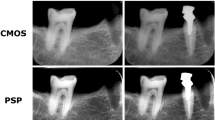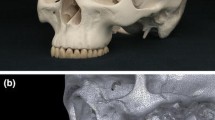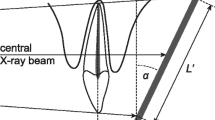Abstract
The objective of this paper is to develop a novel digital subtraction technique for serial intra-oral radiography, which would allow the detection of subtle variations in grey values. Digital images of the maxilla of a dried human skull and of a fresh pig mandible were acquired using intra-oral photostimulable phosphor plates (Digora FMX, Soredex, Helsinki) with an aluminium calibration stepwedge incorporated in the filmholder. Exposures were made with an X-ray tube for intra-oral radiography (Prostyle Intra, Planmeca, Helsinki). During pilot testing, parameter settings were adapted to reach an optimal contrast. Exposures were repeated within a 1-week interval to determine the test–retest reliability of the development. After in vitro and in vivo testing, the exposure technique and software development were used to evaluate its applicability in a pilot clinical case. Although parameter settings remained stable during the in vitro studies, the clinical exposures yielded non-linear digital images, thus, not readily suitable for data acquisition and comparison of the regions of interest. To allow further analysis, image processing was carried out using self-developed software for semi-automated linearisation and optimised contrast normalisation. This processing significantly increased the precise quantisation of jawbone density and the assessment of subtle bone density changes in arbitrarily selected regions of interest of in vivo exposures. The clinical applicability of the technique is demonstrated in a pilot case. It was demonstrated that minute densitometric deviations could be detected. The present technique and image processing may allow the quantification of jawbone density.















Similar content being viewed by others
References
Allen K, Emrich L, Piedmonte M, Hausmann E (1992) Relationship of texture measurements to the prediction of correct evaluation in subtraction radiography. J Periodontal Res 27:197–206
Allen KM, Hausmann E (1996) Analytical methodology in quantitative digital subtraction radiography: analyses of the aluminum reference wedge. J Periodontol 67:1317–1321
Amendolia SR, Bisogni MG, Delogu P, Fantacci ME, Marchi A, Novelli M, Oliva P, Quattrocchi M, Rosso V, Stefanini A, Zucca S (2002) Experimental study of Compton scattering reduction in digital mammographic imaging. IEEE Trans Nucl Sci 49:2361–2365
Benn DK (1990) Limitations of the digital image subtraction technique in assessing alveolar bone crest changes due to misalignment errors during image capture. Dentomaxillofac Radiol 19:97–104
Carlton RR, Adler AM (1996) Principles of radiographic imaging, 2nd edn. Delmar, Albany, NY, p 730
Christgau M, Hiller KA, Schmalz G, Kolbeck C, Wensel A (1998) Quantitative digital subtraction radiography for the determination of small changes in bone thickness: an in vitro study. Oral Surg Oral Med Oral Pathol Oral Radiol Endod 85:462–472
Coatrieux JL (2002) Signal processing and physiological modeling—part 1: surface analysis. Crit Rev Biomed Eng 30:9–35
Couture RA, Hildebolt C (2000) Quantitative dental radiography with a new photostimulable phosphor system. Oral Surg Oral Med Oral Pathol Oral Radiol Endod 89:498–508
Couture RA, Hildebolt CFR (2002) Precise image-receptor calibration and monitoring of beam quality with a step wedge. Dentomaxillofac Radiol 31:56–62
Couture RA, Dixon DA, Hildebolt CF (2005) A precise receptor-positioning device for subtraction radiography, based on cross-arch stabilisation. Dentomaxillofac Radiol 34:231–236
Du Tré F (2004) Applicability of radiologic analytical methods to evaluate the healing efficiency of extraction sockets using bone substitute materials. Master Thesis, Catholic University Leuven, Department of Periodontology, Leuven, Belgium, pp 146
Ellwood RP, Davies RM, Worthington HV (1997) Evaluation of a dental subtraction radiography system. J Periodontal Res 32:241–248
Engelke W, de Valk S, Ruttimann U (1990) The diagnostic value of subtraction radiography in the assessment of granular hydroxylapatite implants. Oral Surg Oral Med Oral Pathol Oral Radiol Endod 69:636–641
Jean A, Epelboin Y, Rimsky A, Soyer A, Ouhayoun JP (1996) Digital image ratio: a new radiographic method for quantifying changes in alveolar bone. Part 1: theory and methodology. J Periodontal Res 31:161–167
Griffiths GS, Brägger U, Fourmousis I, Sterne JAC (1996) Use of an internal standard in subtraction radiography to assess initial periodontal bone changes. Dentomaxillofac Radiol 25:76–81
Guneri P, Lomcali G, Boyacioglu H, Kendir S (2005) The effects of incremental brightness and contrast adjustments on radiographic data: a quantitative study. Dentomaxillofac Radiol 34:20–27
Handschel J, Kleinheinz J, Kelker M, Reuter I, Joos U (1999) Reproducible X-ray projection geometry in edentulous patients. Dentomaxillofac Radiol 28:368–371
Hausmann E, Kutlubay ME, Odrobina D et al (1995) Studies on the angular reproducibility of positioning patients adjacent to an X-ray tube 2. A new electronically guided force-sensitive sensor-based alignment system. J Periodontal Res 30:294–297
Hausmann E, Allen K, Loza J, Buchanan W, Cavanaugh PF Jr (1996) Validation of quantitative digital subtraction radiography using the electronically guided alignment device/impression technique. J Periodontol 67:895–899
Hayakawa Y, Farman AG, Scarfe WC, Kuroyanagi K, Rumack PM, Schick DB (1996) Optimum exposure ranges for computed dental radiography. Dentomaxillofac Radiol 25:71–75
Helmrot E, Carlsson GA, Eckerdal O (1994) Effects of contrast equalization on energy imparted to the patient: a comparison of two dental generators and two types of intraoral film. Dentomaxillofac Radiol 23:83–90
Hildebolt CF, Fletcher G, Yokoyama-Crothers N, Conover GL, Vannier MW (1997) A comparison of the response of storage phosphor and film radiography to small variations in X-ray exposure. Dentomaxillofac Radiol 26:147–151
Janssen PTM, van Palenstein Helderman WH, van Aken J (1989) The detection of in vitro produced periodontal bone lesions by conventional radiography and photographic subtraction radiography using observes and quantitative digital subtraction radiography. J Clin Periodontol 16:335–341
Kitagawa H, Farman AG, Sheetz JP , Brown WP, Lewis L, Benefiel M, Kuroyanagi K (2000) Comparison of three intra-oral storage phosphor systems using subjective image quality. Dentomaxillofac Radiol 29:272–276
Lee SS, Huh YJ, Kim KY, Heo MS, Choi SC, Koak JY, Heo SJ, Han CH, Yi WJ (2004) Development and evaluation of digital subtraction radiography computer program. Oral Surg Oral Med Oral Pathol Oral Radiol Endod 98:471–475
Lehmann TM, Grondahl HG, Benn DK (2000) Computer-based registration for digital subtraction in dental radiology. Dentomaxillofac Radiol 29:323–346
Likar B, Pernus F (1997) Evaluation of three contrast correction methods for digital subtraction in dental radiography: an in vitro study. Med Phys 24:299–307
Loftin R, Webber R, Horton R, Tyndall D, Moriarty J (1998) Effect of projective aspects variations on estimates of changes in bone mass using digital subtraction radiography. J Periodontal Res 33:352–358
Marino A (2000) Chaos and fractals in biology and medicine. Temple presentation. Temple University, Center for Frontier Science, 22 March 2000
Markov VT, Fetisov GV, Zhukov SG (1990) Corrections for absorption and beam inhomogeneity in X-ray single-crystal diffractiometry: method of analytical integration. J Appl Crystallogr 23:94–98
Mol A, Dunn SM (2003) Effect of bone chip orientation on quantitative estimates of changes in bone mass using digital subtraction radiography. J Periodontal Res 38:296–302
Mol A, Dunn SM (2003) The performance of projective standardization for digital subtraction radiography. Oral Surg Oral Med Oral Pathol Oral Radiol Endod 96:373–382
Nummikoski PV, Martinez TS, Matteson SR, McDavid WD, Dove SB (1992) Digital subtraction radiography in artificial recurrent caries detection. Dentomaxillofac Radiol 21:59–64
Ohki M, Okano T, Yamada N (1988) A contrast-correction method for digital subtraction radiography. J Periodontal Res 23:277–280
Ruttiman UE, Webber RL (1987) Volumetry of localized bone lesions by subtraction radiography. J Periodontal Res 22:215–216
Schulze RK, d’Hoedt B (2001) Mathematical analysis of projection errors in “paralleling technique” with respect to implant geometry. Clin Oral Implants Res 12:364–371
Sewerin I (1990) Device for serial intraoral radiography with controlled projection angles. Tandlaegebladet 15:613–617
Syriopoulos K, Velders XL, Geraets WG, van der Stelt PF (1998) A radiographic method for measuring radiation dose based on beam quality. Dentomaxillofac Radiol 27:287–292
Tagger M, Katz A (2003) Radiopacity of endodontic sealers: development of a new method for direct measurement. J Endod 29:751–755
Versteeg CH, Sanderink GC, van Ginkel FC, van der Stelt PF (1998) Effects of calibration and automatic greyscale adjustment on detectability of simulated bone lesions using a storage phosphor system. Dentomaxillofac Radiol 27:240–244
Webber RL, Ruttimann UE, Heaven TJ (1990) Calibration errors in digital subtraction radiography. J Periodontal Res 25:268–275
von Wowern N (1985) Dual-photon absorptiometry of mandibles: in vitro test of a new method. Scand J Dent Res 93:169–177
von Wowern N (1985) In vivo measurement of bone mineral content of mandibles by dual-photon absorptiometry. Scand J Dent Res 93:162–168
von Wowern N, Worsaae N (1988) Bone mineral content of the maxilla estimated by dual-photon absorptiometry after augmentation with bone or hydroxyapatite. J Dent Res 67:1405–1408
von Wowern N (2001) General and oral aspects of osteoporosis:a review. Clin Oral Investig 5:71–82
Yoshioka T, Kobayashi C, Suda H, Sasaki T (1997) Quantitative subtraction with direct digital dental radiography. Dentomaxillofac Radiol 26:286–294
Yoshiura K, Welander U, Shi XQ, Li G, Kawazu T, Tatsumi M, Okamura K, McDavid WD, Kanda S (2001) Conventional and predicted perceptibility curves for contrast-enhanced direct digital intraoral radiographs. Dentomaxillofac Radiol 30:219–225
Zappa U, Simona C, Graf H, van Aken J (1991) In vivo determination of radiographic projection errors produced by a novel film holder and an X-ray beam manipulator. J Periodontol 62:674–683
Author information
Authors and Affiliations
Corresponding author
Additional information
Daniel van Steenberghe is Holder of the P-I Brånemark Chair in Osseointegration.
Rights and permissions
About this article
Cite this article
Tré, F.D., Jacobs, R., Styven, S. et al. Development of a novel digital subtraction technique for detecting subtle changes in jawbone density. Clin Oral Invest 10, 235–248 (2006). https://doi.org/10.1007/s00784-006-0055-2
Received:
Accepted:
Published:
Issue Date:
DOI: https://doi.org/10.1007/s00784-006-0055-2




